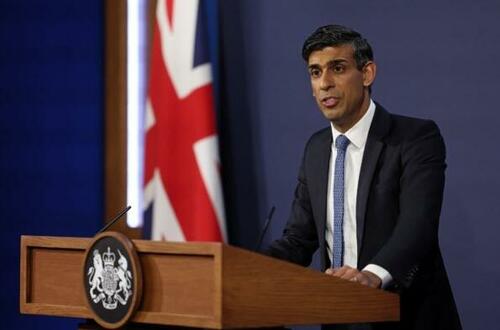
Under the government’s proposed Illegal Migration Bill, anyone who arrives in the UK illegally will be banned from claiming asylum, and will be deported to their home country or a safe third country like Rwanda, and will also be banned from reentry.
But in a majority decision last month, judges at the Court of Appeal overturned an earlier High Court ruling and ruled that the policy is “unlawful.”
The government sought to appeal the decision at the Supreme Court, and the Court of Appeal gave it the go-ahead on Thursday.
Home Secretary Suella Braverman welcomed the decision and defended the government’s “migration partnership” with Rwanda.
A group of people thought to be illegal immigrants gesture as they leave onboard a coach from the Manston immigration short-term holding facility located at the former Defence Fire Training and Development Centre in Thanet, Kent, on Nov. 2, 2022. (Gareth Fuller/PA Media)
She said in a statement: “We need innovative solutions, like our Migration Partnership, to stop the boats, break the business model of the people smuggling gangs, and prevent further loss of life in the Channel.
“I absolutely believe this policy is lawful and both the High Court and Court of Appeal have been unanimously clear that relocating asylum seekers to a safe third country can be done in line with the Refugee Convention.
“The assurances we have had from Rwanda regarding asylum protections are also robust—and both the High Court and Lord Chief Justice found that the arrangements provided sufficient safeguards.”
‘Real Risk’
While the High Court ruled in December that Rwanda’s deportation policy is lawful, the Court of Appeal overturned the ruling last month in a majority decision.
Though Lord Chief Justice Lord Burnett had concurred with the High Court’s ruling, the other two judges—Sir Geoffrey Vos and Lord Justice Underhill—argued that deficiencies in Rwanda’s asylum system mean there is a “real risk” asylum seekers could be returned to their home country and face persecution or other inhumane treatment when they may have a good claim for asylum.

Prime Minister Rishi Sunak speaks during a press conference in Downing Street, London, on July 13, 2023. (Henry Nicholls/PA Media)
Following the ruling, Prime Minister Rishi Sunak said he “fundamentally” disagrees with the court’s conclusion.
“I strongly believe the Rwandan government has provided the assurances necessary to ensure there is no real risk that asylum seekers relocated under the Rwanda policy would be wrongly returned to third countries—something that the Lord Chief Justice agrees with.
“Rwanda is a safe country. The High Court agreed. The United Nations High Commissioner for Refugees have their own refugee scheme for Libyan refugees in Rwanda. We will now seek permission to appeal this decision to the Supreme Court.
“The policy of this government is very simple, it is this country—and your government—who should decide who comes here, not criminal gangs. And I will do whatever is necessary to make that happen.”
Parliamentary Ping-Pong
Meanwhile, the two houses of Parliament continue to wrestle over the Illegal Migration Bill.
The Commons overturned a raft of earlier revisions by the House of Lords, but the unelected chamber inflicted a string of fresh defeats on the government this week over the bill.
Peers want further concessions on limits to the detention of children, modern slavery protections, and the provision of safe and legal routes for refugees to the UK.
On Friday, immigration minister Robert Jenrick told BBC Radio 4’s “Today” programme that ministers are not planning to make further compromises.
He said that critics of the bill have not put forward any “credible alternative.”
“It’s incumbent on those who choose to criticise our approach to provide an alternative.
“It’s not a serious or grown-up way to conduct a debate to say, ‘well we have concerns about Rwanda,’ ‘we don’t like the compliant environment’—‘We don’t want this, we don’t want to,’ but not to come up with an alternative.”
The bill now heads back to the Commons where MPs will consider the latest changes made by peers.

No comments:
Post a Comment